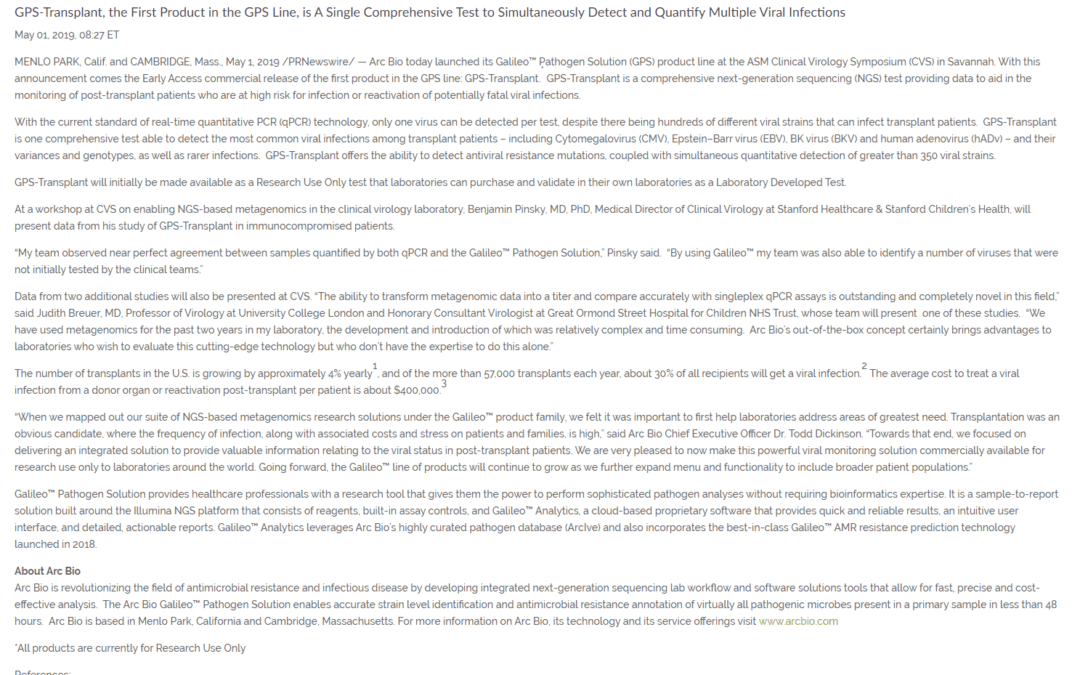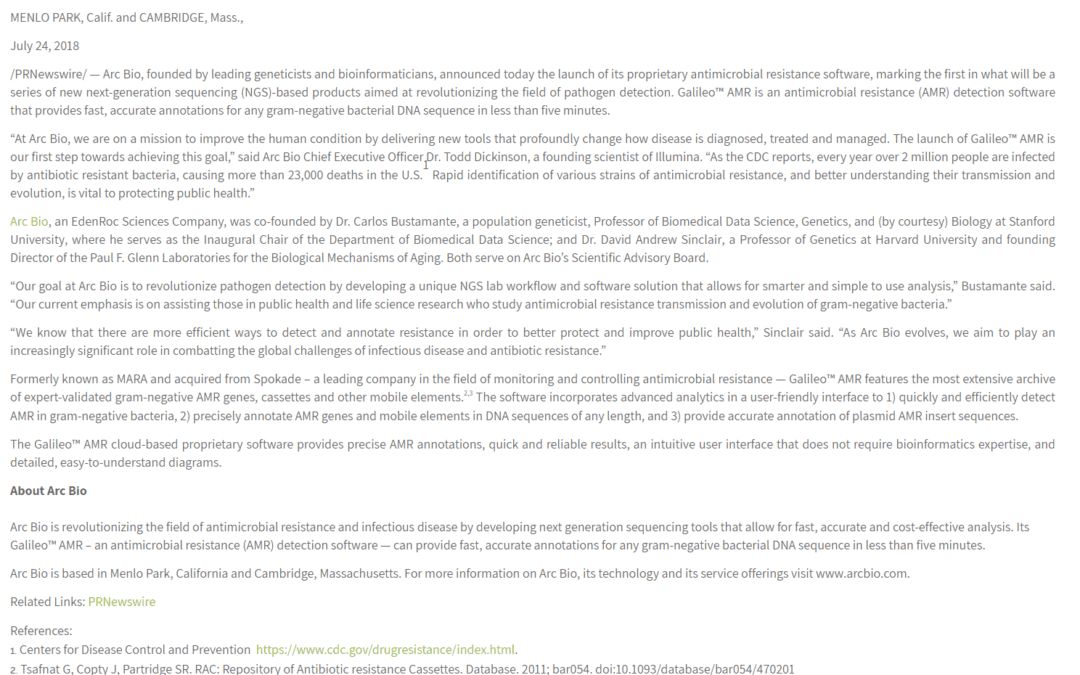GPS-Transplant, the First Product in the GPS Line, is A Single Comprehensive Test to Simultaneously Detect and Quantify Multiple Viral Infections
May 01, 2019, 08:27 ET
MENLO PARK, Calif. and CAMBRIDGE, Mass., May 1, 2019 /PRNewswire/ — Arc Bio today launched its Galileo™ Pathogen Solution (GPS) product line at the ASM Clinical Virology Symposium (CVS) in Savannah. With this announcement comes the Early Access commercial release of the first product in the GPS line: GPS-Transplant.* GPS-Transplant is a comprehensive next-generation sequencing (NGS) test providing data to aid in the monitoring of post-transplant patients who are at high risk for infection or reactivation of potentially fatal viral infections.
With the current standard of real-time quantitative PCR (qPCR) technology, only one virus can be detected per test, despite there being hundreds of different viral strains that can infect transplant patients. GPS-Transplant is one comprehensive test able to detect the most common viral infections among transplant patients – including Cytomegalovirus (CMV), Epstein–Barr virus (EBV), BK virus (BKV) and human adenovirus (hADv) – and their variances and genotypes, as well as rarer infections. GPS-Transplant offers the ability to detect antiviral resistance mutations, coupled with simultaneous quantitative detection of greater than 350 viral strains.
GPS-Transplant will initially be made available as a Research Use Only test that laboratories can purchase and validate in their own laboratories as a Laboratory Developed Test.
At a workshop at CVS on enabling NGS-based metagenomics in the clinical virology laboratory, Benjamin Pinsky, MD, PhD, Medical Director of Clinical Virology at Stanford Healthcare & Stanford Children’s Health, will present data from his study of GPS-Transplant in immunocompromised patients.
“My team observed near perfect agreement between samples quantified by both qPCR and the Galileo™ Pathogen Solution,” Pinsky said. “By using Galileo™ my team was also able to identify a number of viruses that were not initially tested by the clinical teams.”
Data from two additional studies will also be presented at CVS. “The ability to transform metagenomic data into a titer and compare accurately with singleplex qPCR assays is outstanding and completely novel in this field,” said Judith Breuer, MD, Professor of Virology at University College London and Honorary Consultant Virologist at Great Ormond Street Hospital for Children NHS Trust, whose team will present one of these studies. “We have used metagenomics for the past two years in my laboratory, the development and introduction of which was relatively complex and time consuming. Arc Bio’s out-of-the-box concept certainly brings advantages to laboratories who wish to evaluate this cutting-edge technology but who don’t have the expertise to do this alone.”
The number of transplants in the U.S. is growing by approximately 4% yearly1, and of the more than 57,000 transplants each year, about 30% of all recipients will get a viral infection.2 The average cost to treat a viral infection from a donor organ or reactivation post-transplant per patient is about $400,000.3
“When we mapped out our suite of NGS-based metagenomics research solutions under the Galileo™ product family, we felt it was important to first help laboratories address areas of greatest need. Transplantation was an obvious candidate, where the frequency of infection, along with associated costs and stress on patients and families, is high,” said Arc Bio Chief Executive Officer Dr. Todd Dickinson. “Towards that end, we focused on delivering an integrated solution to provide valuable information relating to the viral status in post-transplant patients. We are very pleased to now make this powerful viral monitoring solution commercially available for research use only to laboratories around the world. Going forward, the Galileo™ line of products will continue to grow as we further expand menu and functionality to include broader patient populations.”
Galileo™ Pathogen Solution provides healthcare professionals with a research tool that gives them the power to perform sophisticated pathogen analyses without requiring bioinformatics expertise. It is a sample-to-report solution built around the Illumina NGS platform that consists of reagents, built-in assay controls, and Galileo™ Analytics, a cloud-based proprietary software that provides quick and reliable results, an intuitive user interface, and detailed, actionable reports. Galileo™ Analytics leverages Arc Bio’s highly curated pathogen database (ArcIve) and also incorporates the best-in-class Galileo™ AMR resistance prediction technology launched in 2018.
About Arc Bio
Arc Bio is revolutionizing the field of antimicrobial resistance and infectious disease by developing integrated next-generation sequencing lab workflow and software solutions tools that allow for fast, precise and cost-effective analysis. The Arc Bio Galileo™ Pathogen Solution enables accurate strain level identification and antimicrobial resistance annotation of virtually all pathogenic microbes present in a primary sample in less than 48 hours. Arc Bio is based in Menlo Park, California and Cambridge, Massachusetts. For more information on Arc Bio, its technology and its service offerings visit www.arcbio.com
*All products are currently for Research Use Only
References:
1Data from the Health Resources & Service Administration, an agency of the U.S. Department of Health and Human Services, based on U.S. transplants in 2012 through 2017
2Azevedo* LS, Pierrotti LC, Abdala E, et al. Cytomegalovirus infection in transplant recipients. Clinics. 2015;70(7):515-523
3Fu L. Luan, Linda J. Stuckey, Jeong M. Park, Daniel Kaul, Diane Cibrik, and Akinlolu Ojo Six-Month Prophylaxis Is Cost Effective in Transplant Patients at High Risk for Cytomegalovirus Infection J. Am. Soc. Nephrol. 2009 20: 2449-2458

